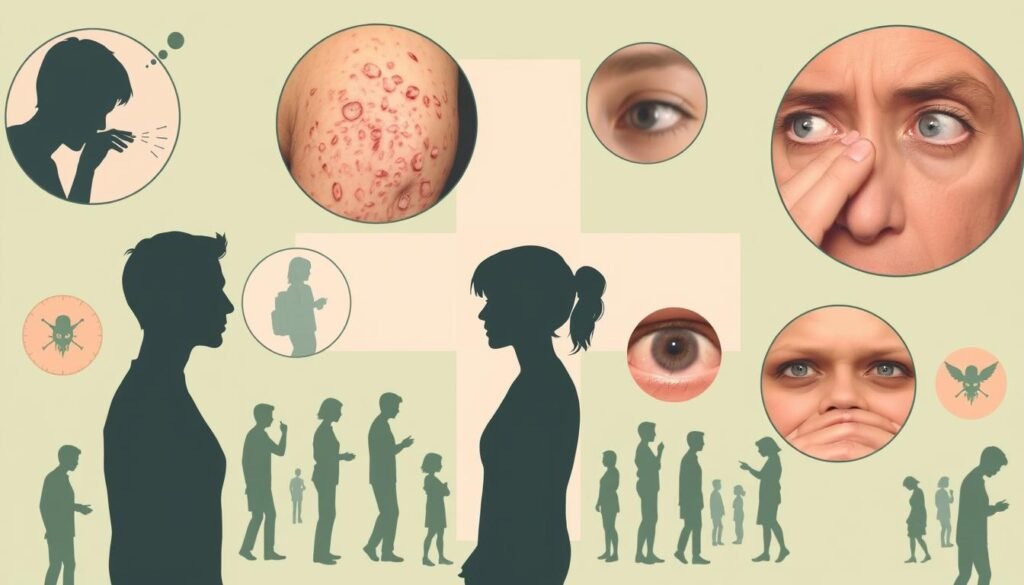About 50 million Americans battle allergies yearly. This shows how common allergies are. A less known symptom is allergy fatigue. Unlike common symptoms such as sneezing and itchy eyes, allergy fatigue is often missed. Allergy sufferers tend to feel tired, even after sleeping well. This can greatly affect their daily life and productivity. If you regularly feel this way, it’s important to understand allergy fatigue. This guide explores its causes, symptoms, and how to find relief.
Key Takeaways
- Allergy fatigue is a common yet unrecognized symptom for many who suffer from allergies.
- Understanding the signs of allergy fatigue can help in managing daily activities effectively.
- A variety of allergens, including pollen and pet dander, can lead to significant fatigue.
- Recognizing the difference between allergy fatigue and other types of fatigue is crucial.
- Effective management strategies can mitigate the impacts of allergy fatigue on everyday life.
Understanding Allergy Fatigue
Allergies impact people all over the world, leading to various symptoms. One common but often ignored issue is allergy fatigue. It happens when the body fights allergens non-stop. Because of this fight, histamines are released. They cause not just physical signs like sneezing but also mental tiredness.
Seasonal allergies play a big role in ongoing fatigue. They make the body work hard to battle these invaders. Allergic sinusitis makes this worse, causing brain fog and less focus. Over time, dealing with allergens can wear down the immune system. This makes it tough for the body to handle infections, leading to more fatigue.
Allergy fatigue makes you feel extremely tired, both in mind and body. Signs include a runny nose, postnasal drip, and bad sleep. Antihistamines might make you more tired by making you sleepy and messing with your sleep. Learning how to spot and stay away from allergens is key in handling symptoms.
To manage allergy fatigue, using medicines to ease symptoms can help with tiredness. If you’re dealing with constant allergy symptoms, getting advice from doctors is wise. Fighting allergies to boost well-being is a big step for those affected.
The Science Behind Allergy Fatigue
Allergy fatigue is caused by your immune system working hard. When allergens enter the body, the immune system fights back. It makes cells and proteins to attack the invaders. This can make the immune system tired because it uses a lot of energy during allergic reactions. People often feel more tired during spring and summer. This is because of higher pollen levels.
Histamines play a big role in making you feel tired. They cause inflammation in the body and make symptoms like a stuffy nose worse. This inflammation can block your nose, making it hard to sleep. If you can’t breathe well, you might not get enough oxygen, which makes you feel even more tired.
Not sleeping well makes allergy fatigue worse. Inflammation affects your focus and can mess with your brain, like making it hard to pay attention. Studies show that when allergy symptoms get worse, so do your heart rate and mood. This makes you feel more tired. Taking antihistamines is common, but they can make you drowsy, adding to the problem.
To handle allergy fatigue better, it’s key to understand how it works. With the right treatments, you can control your symptoms and feel better.
What Does Allergy Fatigue Feel Like
Allergy fatigue is very challenging and affects everyday life. People feel extremely tired and struggle to focus due to *brain fog*. Unlike normal tiredness, this issue is caused by the immune system reacting to allergens. Knowing this can help handle allergy problems better.
Common Symptoms Associated with Allergy Fatigue
There are key symptoms of allergy fatigue. People often feel:
- Continuous tiredness throughout the day
- Irritability due to lack of energy
- Reduced productivity at work or home
- Headaches and body aches
These symptoms together can drastically reduce energy. This impacts one’s overall health in a negative way.
How Allergy Fatigue Differs from Other Types of Fatigue
Allergy fatigue is different from normal tiredness. Regular fatigue might come from not sleeping well or too much hard work. Allergy fatigue happens because your body fights against allergens.
| Type of Fatigue | Causes | Symptoms |
|---|---|---|
| Allergy Fatigue | Immune response to allergens | Brain fog, irritability, energy depletion |
| General Fatigue | Lack of sleep, overexertion | Sleepiness, lack of motivation |
It’s important to know the difference. This helps in finding the right treatment and making changes to your lifestyle. Thus, you can fight allergy fatigue more effectively.
Common Allergens That Cause Fatigue
Allergens significantly lower our energy, leading to widespread fatigue during allergy season. It’s vital to understand different allergens to manage and lessen tiredness.
Pollen and Seasonal Allergies
Seasonal fatigue is a common effect of pollen allergies in spring and fall. Our bodies react to pollen by releasing chemicals that tire us out. Symptoms like nasal congestion can also disturb our sleep, making us more fatigued. By taking medications on time, we can lessen their impact.
Indoor Allergens: Dust Mites and Mold
Indoor allergens, such as dust mites and mold, continuously expose us to substances that tire us. They stir up an inflammatory response, draining our energy. By cleaning regularly, ensuring good airflow, and using air purifiers, we can protect ourselves, enhancing our energy and focus.
Food Allergies and Their Impact on Energy Levels
Food allergies often cause food allergy fatigue. Issues with digestion from these allergies sap our strength, leaving us sluggish. By tracking what we eat and pinpointing what triggers our allergies, we can manage our energy better. Tools like dietary changes are helpful for this.

| Type of Allergen | Symptoms | Impact on Fatigue |
|---|---|---|
| Pollen | Nasal congestion, sneezing | Increased tiredness during peak seasons |
| Dust Mites | Itchy eyes, nasal irritation | Chronic exposure leading to exhaustion |
| Mold | Respiratory issues, headaches | Contributes to chronic fatigue |
| Food Allergies | Digestive disturbances, skin reactions | Significant energy drain post-ingestion |
Causes of Allergy-Related Fatigue
Allergy-related fatigue starts when our immune system reacts to allergens. Our body fights off these allergens with chemicals like histamines. This leads to swelling and a sense of being tired. People with frequent allergies feel this tiredness more deeply.
Immune System Response and Histamine Release
Allergies kick our immune system into gear, leading to symptoms that drain our energy. Histamines cause stuffy noses, sneezing, and a dripping nose. These symptoms can make us feel very tired. In 2018, a study showed that people with allergies often feel more tired and sleepy than those without.
This ongoing swelling can cause long-term tiredness, affecting daily life.
How Allergies Disrupt Sleep
Allergies can mess with our sleep, trapping us in a cycle of exhaustion. Issues like congestion and coughing cut into our sleep quality. As a result, we don’t rest well for long periods. People with allergies tend to sleep less, no matter the season.
Moreover, allergy meds can worsen sleep problems. Antihistamines might make us sleepy, but decongestants can keep us awake. To fight off tiredness from allergies, we need to find out what’s triggering them and talk to a doctor. Managing triggers and knowing how to sleep better are key to breaking the cycle of allergy fatigue. For more on how these issues lead to exhaustion, check out this helpful resource.
Combating Allergy Fatigue
Dealing with allergy fatigue starts with knowing and managing allergens well. Testing for allergies is key to finding out what makes you tired. By knowing this, you can avoid these allergens and feel better. At the same time, sleeping well is very important in fighting fatigue. Keeping your bedroom clean and free from allergens helps you sleep better. This is especially true for those dealing with allergies.
Allergy Testing and Identifying Triggers
Getting tested for allergies is crucial. It lets people find out what specifically bothers them. By identifying these triggers, they can make changes to avoid them. Tests such as skin prick tests and blood tests show if you’re sensitive to things like pollen, dust mites, mold, and pets. Knowing your triggers helps you manage your symptoms better.
Improving Sleep Hygiene to Combat Fatigue
Improving your sleep habits can greatly ease allergy-related tiredness. Effective ways include:
- Keeping the bedroom free of allergens by using dust-proof covers on bedding.
- Utilizing air purifiers to reduce airborne irritants.
- Establishing a consistent sleep schedule, ensuring adequate rest each night.
- Engaging in relaxing activities before bed, such as reading or meditating, to enhance sleep quality.
Focusing on good sleep habits can boost your energy and health. Managing allergens at home leads to better sleep and less fatigue. This approach helps you live a more energetic and healthier life.
Medications and Treatments for Allergy Fatigue
Managing allergy fatigue starts with exploring various medications and treatments. There are different options to help lessen symptoms. This lets people feel energetic again. Knowing about antihistamines can greatly enhance life quality for allergy sufferers.
Over-the-Counter and Prescription Antihistamines
Antihistamines like cetirizine, loratadine, and diphenhydramine are available without a prescription. Cetirizine, found in Zyrtec, is less sedating than old antihistamines. These medicines are key in managing seasonal allergies, which can make people feel tired. Some antihistamine eye drops require a prescription. Around 30% of these fall into that category.
Discussing the Side Effects of Allergy Medications
It’s vital to talk about side effects of allergy medicines with doctors. Medications like cetirizine and loratadine can cause sleepiness in about 10% of users. Over-the-counter corticosteroid creams help with allergic skin reactions. Yet, they must be used cautiously for long periods under doctor’s advice. Drugs like Montelukast may cause anxiety or sleep issues. Knowing this helps people make better treatment choices.
Lifestyle Changes for Long-Term Relief
Want to fight allergy fatigue? It starts with changing your daily habits. A lifestyle for allergy fatigue means making big changes to find lasting relief. A key focus? Your diet.
Eating right plays a big role. Foods that fight inflammation can help ease allergy symptoms and boost your energy.
The Role of Diet in Managing Allergies and Fatigue
Eating foods packed with antioxidants and omega-3s is vital. These nutrients help your immune system fight allergy fatigue. Let’s include:
- Fruits and vegetables (especially onions and apples for their quercetin content)
- Fatty fish like salmon to enhance cognitive function
- Nuts and seeds for healthy fats
These choices can change how you feel. You might notice less brain fog, a common allergy issue. It shows how food choices impact our energy and health.
Importance of Regular Exercise
Exercise isn’t just good for fitness. It boosts your immune system and helps you sleep better, even with allergies. Activities like walking or yoga can lift your energy and mood.
Adding simple exercises to your day can tackle the tiredness from allergies. Stick with it, and you’ll better handle allergies in the future.
Stress Management Techniques
Handling stress well is key to easing allergy fatigue. Try these stress management techniques:
- Meditation and mindfulness practices
- Deep breathing exercises to relieve tension
- Engaging in hobbies that promote relaxation
These methods can lessen allergies’ toll on your mind and mood. Better stress control also makes fighting allergy symptoms easier, reducing fatigue.

For more on battling allergy-induced tiredness, check this informative resource. Embracing these lifestyle changes creates a strong base for long-term relief.
| Dietary Strategies | Exercise Routines | Stress Management Techniques |
|---|---|---|
| Quercetin-rich foods (onions, apples) | Walking or jogging | Meditation and mindfulness |
| Omega-3 fatty acids (salmon, walnuts) | Yoga and stretching | Breathing exercises |
| Fruits and vegetables | Group fitness classes | Creative hobbies (painting, gardening) |
Allergen Avoidance Strategies
Effectively managing allergies can boost your energy and improve life quality. Avoiding allergens at home is essential for those seeking relief from allergy symptoms. By adopting certain strategies, you can keep your home allergen-free and protect yourself outdoors during high pollen seasons.
Creating an Allergen-Free Home Environment
Creating a home free of allergens involves several steps:
- Regular cleaning: Dust surfaces, vacuum carpets, and wash bedding often to lower indoor allergens.
- Air purification: Use HEPA filters in air purifiers and HVAC systems to cut down on airborne allergens.
- Hypoallergenic materials: Opt for hypoallergenic pillow and mattress covers to lessen dust mite exposure.
Outdoor Precautions During High Pollen Seasons
Take certain steps when pollen counts spike to protect against outdoor allergies:
- Check local pollen forecasts and stay indoors when pollen is high.
- Wear a mask outside to avoid breathing in pollen.
- After being outdoors, shower and change to remove pollen from your body and hair.
These allergen avoidance tips can greatly enhance your well-being. If allergies are making you constantly tired, consider getting tested for allergens. Knowing your triggers allows for a more effective symptom management. Better allergy control can also improve sleep quality, which is crucial for good health. For more details on battling allergy fatigue, check out this resource.
When to Seek Medical Advice
Knowing when to get medical help is key in handling allergy fatigue well. Patients should watch for symptoms that require medical advice. This is important if conditions get worse even after trying home remedies.
Knowing When to Consult an Allergist
If you keep sneezing or have a runny nose, it might be time to see an allergy consultation. An allergist can come up with a plan perfect for you. They help figure out if your issues are allergies or something else.
Itchy, watery eyes can also mean allergy fatigue. Knowing this difference matters. If you’re still tired all the time, you should definitely see an allergist.
Chronic Allergy Management Options
There are many ways to deal with long-term allergies. Immunotherapy is one, where you slowly get used to allergens. Medicine like antihistamines can also make you feel better.
Knowing when home cures just aren’t enough is vital. If breathing gets hard or you get a fever, see a doctor fast. This ensures you get the right treatment quickly.

Patient Experiences and Testimonials
Learning about others’ battles with allergy fatigue helps us find better ways to cope. People share their struggles and achievements in dealing with allergy challenges. Their stories reveal not just the hard times, but also share tips for doing better.
Real-Life Stories of Managing Allergy Fatigue
Many share how they fight off allergy fatigue with treatments and lifestyle changes. A big part of their stories is changing what they eat to ease symptoms. For example, those allergic to alpha-gal stop eating red meat, which means being careful even with treats like ice cream.
Getting support is another big help in dealing with allergy fatigue. Feeling better comes easier when talking with others in similar situations, either in person or online. This feeling of not being alone keeps people motivated to keep fighting their allergy issues.
Community Support and Resources
Having access to help is vital for people facing allergy fatigue. Groups meet in person to share problems and solutions. And online forums are always there to offer support and advice. These help people feel less alone and can give tips for better symptom management.
Conclusion
Allergy fatigue is not just another symptom. It’s a complex issue that impacts many people, especially when allergies flare up. By understanding what’s behind it and identifying common triggers like pollen and dust mites, you can start to take control. Actions such as taking the right medication and making lifestyle changes can really help.
Problems like allergic rhinitis can mess with your sleep, leaving you tired all the time. A regular sleep schedule, a better sleep environment, and advice from an allergist can make a big difference. These steps can boost your sleep quality and energy levels.
Dealing with allergy fatigue means being informed and taking action. Steering clear of allergens and embracing medical treatments can bring back your energy. This way, dealing with allergies and fatigue becomes easier, improving your day-to-day life.